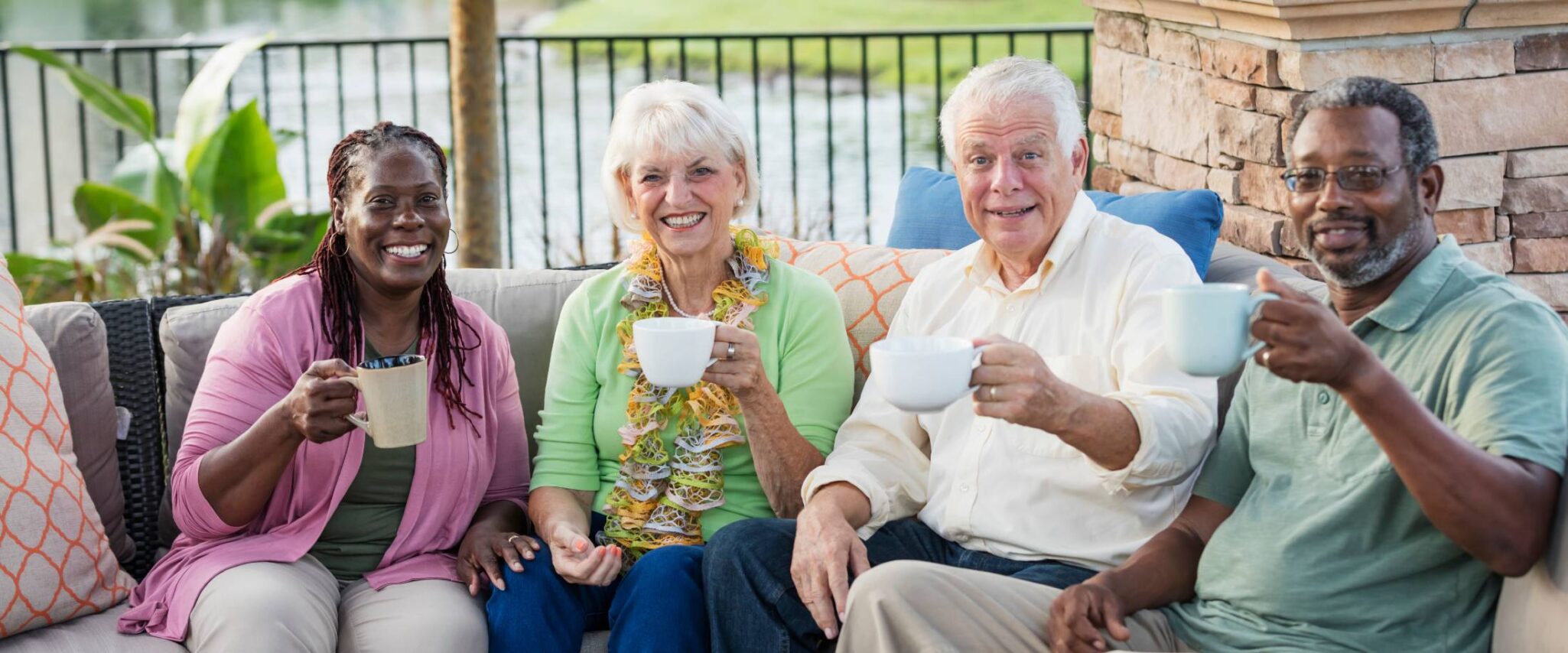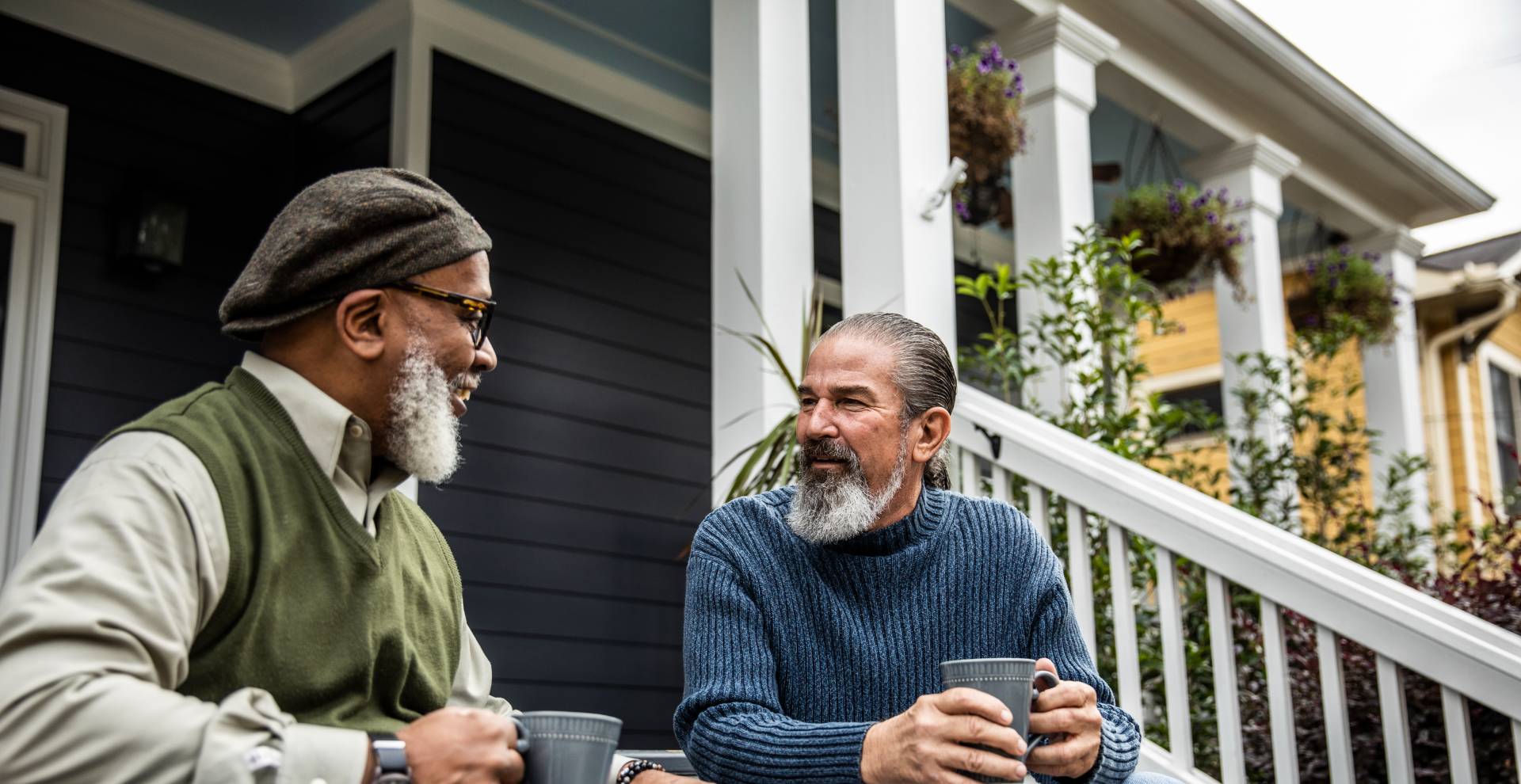Why Are Retirement Community Residents Happier?

While there are several different types of retirement community options available (55+, independent living, Life Plan Community, etc.), is there one where residents are consistently happier and more satisfied with their life? In fact, there is. According to the Mather Institute’s landmark Age Well Study, older adults who choose a Life Plan Community report more happiness and greater quality of life than those who don’t.
Although everyone’s definition of happiness changes through the years, most of us enter retirement with a pretty good idea of what will make us happy and why. Universally, retirees seek to escape stress and create more time for what they want to do. Sorting out utility bills, mowing the lawn, buying or repairing appliances, mending a leaky roof — homeownership responsibilities can be tiresome. Even if you’re still active enough to keep up with your household chores, moving to a maintenance-free or reduced maintenance community opens up a lot more possibilities.
What Is the Age Well Study?
Designed in collaboration with Northwestern University, the Age Well Study is the only national longitudinal study evaluating the impact of living in a Life Plan Community on residents’ cognitive, physical and psychosocial health and well-being. When the survey was launched in 2018, it focused on three components of health:
- Self-reported health
- Physical activity
- Healthy diet
Year One Results
Right from the start, the Age Well Study compared the health of older adults living in Life Plan Communities vs. the Community-at-Large. 5,148 residents from 80 Life Plan Communities participated in the survey and here are some of the results:
- Self-reported health: On average, Life Plan Community participants rate their health between “good” and “very good.”
- Number of chronic conditions: Life Plan Community participants have on average about two chronic health conditions diagnosed by a doctor, such as high blood pressure or diabetes. The number of chronic health conditions is significantly lower for residents of Life Plan Communities compared to older adults in the Community-at-Large.
- Mood: Overall, Life Plan Community participants’ mood was generally positive over the last 30 days, and they tended to experience a more positive mood.
- Optimism/pessimism: Overall, Life Plan Community participants have higher levels of optimism and lower levels of pessimism than the comparison group, which suggests they have a positive outlook on the future.
- Stress: On average, Life Plan Community participants experience low levels of stress, which suggests that they feel capable of handling current challenges in their lives.
- Intellectual wellness: Intellectual wellness involves expanding knowledge and skills through a variety of resources, including creative activities that help maintain cognitive function. 96% of Life Plan Community resident respondents reported reading a book or newspaper at least once per week.
- Social wellness: Social wellness emphasizes creating and maintaining healthy relationships by talking, sharing interests, and actively participating in social events. 69% of residents reported that moving to a Life Plan Community “somewhat” or “greatly improved” their social wellness.
- Physical wellness: Physical wellness refers to regular engagement in physical activity and maintaining a healthy diet and appropriate utilization of health care, as well as engaging in healthy behaviors such as getting enough sleep and maintaining personal safety. The average number of chronic health conditions reported by Life Plan Community residents was fewer than two.
Year Three Results
In 2020, the study focused on factors associated with resident happiness and life satisfaction, including better physical and mental health, along with more positive social interactions. 4,191 residents from 122 Life Plan Communities participated in the survey. Here’s what the study found:
Social/communal factors and happiness and life satisfaction
- Sense of community: Residents with a greater sense of social cohesion and community belonging were happier and more satisfied with life.
- Religiosity: More religious residents were more satisfied with life, but religiosity was not significantly related to happiness.
- Spirituality: More spiritual residents were happier, but spirituality was not significantly related to life satisfaction.
Health and happiness and life satisfaction
- Self-reported health: Residents with better self-reported health described greater levels of happiness and higher life satisfaction.
- Physical activity: Greater physical activity was associated with greater happiness, but it was not related to life satisfaction.
- Healthy diet: Residents who indicated that they have healthier diets tended to be happier and more satisfied with life.
Satisfaction with where they live
Approximately 92% of respondents were highly satisfied (either “very satisfied” or “completely satisfied”) with the place where they live, and 90% were highly satisfied with the city or town where they live. Most respondents were also highly satisfied with their daily life and leisure (85%), financial situation (82%) and family life (79%). Respondents reported lower satisfaction with health, with 60% highly satisfied.
Satisfaction with senior living community and happiness and life satisfaction
91% of respondents were “completely” or “very” satisfied with their senior living community.
Overall Age Well Study Findings
The latest report from the study examines changes in the health and wellness of residents over five years compared to older adults from the community-at-large. The findings include:
- Life Plan Community residents continued to report better physical, emotional, intellectual, social and vocational wellness than their community-at-large counterparts.
- From year one to five, social contact significantly increased for residents.
- Overall engagement in intellectual activities significantly increased for residents (including increased writing and attending educational classes and lectures) and decreased for older adults in the Community-at-Large.
Enjoy a Carefree Lifestyle at Freedom Village at Brandywine
See why moving into a retirement community can help you get even more out of life. Seniors from Chester County, across the nation and beyond choose our community for our active and engaging lifestyle combined with the peace of mind of a continuum of care and the financial benefits of Life Care. Why not see if we offer the right lifestyle for you? Contact us today at 484-288-2200.




